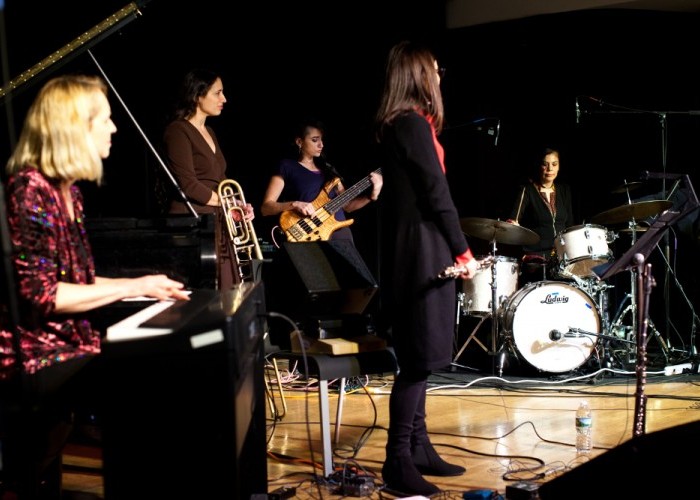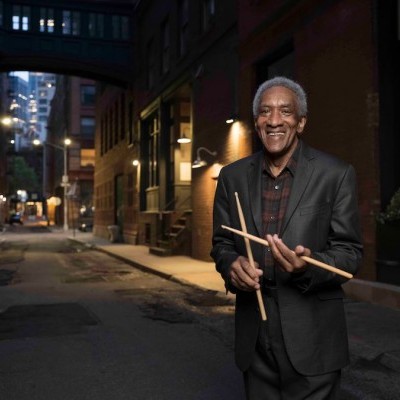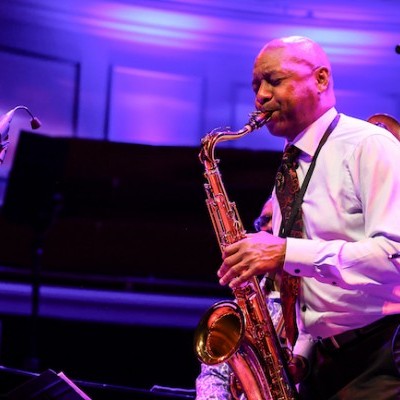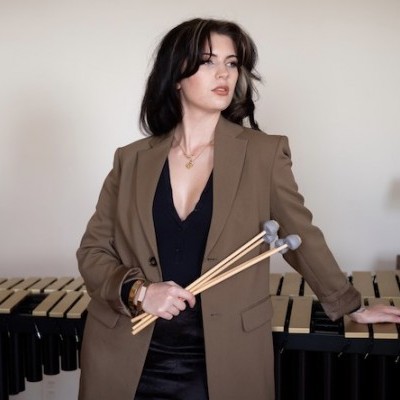Jun 3, 2025 11:25 AM
In Memoriam: Al Foster, 1943–2025
Al Foster, a drummer regarded for his fluency across the bebop, post-bop and funk/fusion lineages of jazz, died May 28…

After taking part in a discussion on gender and jazz, pianist Monika Herzig’s SHEroes ensemble performed April 4 at The New School in New York.
(Photo: Gulnara Khamatova)“You play good, for a girl.”
Every instrumentalist on the “Jazz and Gender” panel discussion at The New School on April 4 had received this backhanded compliment at some point in her career. The panel, comprising pianist and educator Monika Herzig, and five players from her all-women SHEroes band, was convened to address how gender bias affects female musicians’ training, career opportunities, as well as self-image.
Each women spoke candidly and with some humor about what it’s like to be the only female jazz player in the room.
Panel moderator and ethnomusicologist Aja Burrell Wood opened the discussion with some probing questions: How is jazz gendered? Do we see jazz as a masculine form of music? If so, how do female musicians navigate the tricky terrain between one’s gender identity and wanting (or needing) to be one of the guys?
Herzig pointed out that the gender divide in music starts early. The first hurdle that a female jazz musician needs to overcome is picking an instrument, which usually happens in middle school. Speaking generally, pre-adolescent girls are more self-conscious than pre-adolescent boys, and therefore less likely to feel comfortable with the “stand-up-and-play” dynamic of an educational jazz ensemble.
To remedy the situation, Herzig said, middle-school educators need to use teaching methods that encourage apprehensive students to participate during these important developmental years.
Music education doesn’t get any easier for women as they proceed through high school and into college. Herzig, a senior lecturer at Indiana University’s School of Public and Environmental Affairs, noted that while the majority of early-education teachers are women, the ratio of female-to-male teachers shrinks in high school and college. This means that by the time a female musician enters college, where her jazz professors likely are all male, she faces a dearth of role models and mentors in the field.
Guitarist Leni Stern gave an example that underscores the importance of finding female musicians with inspiring careers to emulate. As a budding guitarist in Germany, Stern saw pianist Carla Bley’s photo and vowed to become a musician like her.
“I looked at her photo and thought, ‘This is my destiny,’” she recalled.
Coincidentally, she later became Bley’s copyist and benefited directly from Bley’s mentorship.
Peer pressure also plays a role in discouraging young female musicians. Several panelists regretted the creative collaborations lost to exclusion from their fellow musicians’ all-male jazz hangs. And in some cases, the female players were bullied or harassed for their choice of instrument. But for bassist Amanda Ruzza, who grew up in a musical family in Brazil and attended The New School on a music scholarship, bullying only made her dig deeper into her own work.
“I’d just go home and play my bass,” she said, laughing.
Israeli-born Reut Regev, SHEroes’ trombonist, noted that women bandleaders face specific challenges, stemming from negative stereotypes about female authority.
“When you’re a woman in power, you don’t want to tell a man what to do,” she observed. “If you’re a woman, the perception is either that you aren’t good enough or that you’re a bitch.”
Fair enough, flutist Jamie Baum admitted. But it’s always tough to be the one in charge, regardless of gender.
“To bring out the best in a musician, it takes sensitivity to get what you need without hampering the creativity,” she said, adding that it had taken her a long time to realize that she wasn’t giving the male players in her group the direction they wanted. Even so, the best band for Baum—who’s released seven albums as a leader or co-leader and is set to release Bridges on Sunnyside in May—is one of like-minded musicians, where musical direction is kept at a minimum.
While the panelists did not speak entirely in the past tense regarding gender bias in jazz, many acknowledged ways in which the jazz world has become more welcoming to women in recent years.
Drummer Karina Colis sees that globalization has been a positive force for female musicians; some countries, like the U.S., offer greater educational and performing opportunities for women than did her native Mexico, where music wasn’t taught in school when she was growing up. After winning a scholarship to the Berklee College of Music, her career began to thrive.
To cap the panel discussion, the musicians took to the stage with several selections from Herzig’s just-released album, Sheroes (Whaling City Sound). From the bandleader’s gripping ballad “Nancy Wilson Portrait” (featuring Ingrid Jensen full-bore on trumpet) to Stern’s smoothly riveting “Bubbles” and Regev’s engagingly eclectic “I Am A Superstar,” each tune celebrated female musicianship.
At some point during the charged set, all questions about gender and jazz faded into the background.
The main takeaway: These musicians just play good. Real good. DB

Foster was truly a drummer to the stars, including Miles Davis, Sonny Rollins and Joe Henderson.
Jun 3, 2025 11:25 AM
Al Foster, a drummer regarded for his fluency across the bebop, post-bop and funk/fusion lineages of jazz, died May 28…

“Branford’s playing has steadily improved,” says younger brother Wynton Marsalis. “He’s just gotten more and more serious.”
May 20, 2025 11:58 AM
Branford Marsalis was on the road again. Coffee cup in hand, the saxophonist — sporting a gray hoodie and a look of…

“What did I want more of when I was this age?” Sasha Berliner asks when she’s in her teaching mode.
May 13, 2025 12:39 PM
Part of the jazz vibraphone conversation since her late teens, Sasha Berliner has long come across as a fully formed…

Roscoe Mitchell will receive a Lifetime Achievement award at this year’s Vision Festival.
May 27, 2025 6:21 PM
Arts for Art has announced the full lineup for the 2025 Vision Festival, which will run June 2–7 at Roulette…

Benny Benack III and his quartet took the Midwest Jazz Collective’s route for a test run this spring.
Jun 3, 2025 10:31 AM
The time and labor required to tour is, for many musicians, daunting at best and prohibitive at worst. It’s hardly…